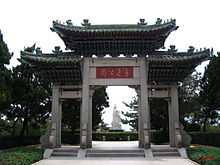Lu Xun Park (Qingdao)

Lu Xun Park (Chinese: 鲁迅公园 (青岛), Lǔxùn gōngyuán (qīngdǎo)) is a park in Qingdao, Shandong, China, dedicated to the memory of Lu Xun, a famous writer during the May Fourth Movement.
The park stretches for nearly a kilometer along the Huiquan Bay, and covers four hectares with a combination of natural setting and cultural sites. Popular places like Number One Bathing Beach, Small Qingdao Island and Little Fish Hill are in the park's neighborhood.[1][2]
History
[edit]The park was built in 1929. It was previously known as Ruoyu Park and Seashore Park. It got its present name in 1950 to honor Lu Xun, a leading Chinese writer. In October 1986, a three-meter high granite sculpture of Lu was installed at the park's entrance to mark the 50th anniversary of his death.[1] In 2001, several new attractions were added, including the Monument of Lu Xun's Autobiography and the Poetry Corridor.[3]
Features
[edit]The park's main entrance is a stone archway sheathed in glazed tiles—constructed, like most of the park's other features, as a memorial. The park's name is engraved on the gateway in Lu Xun's own script. Visitors then enter an area of pine woods, rugged reefs, exquisite pavilions and sea dogs. A narrow, undulating stone path weaves through this setting.[1]
The literary works of Lu Xun are commemorated in a 246 feet-long corridor where 45 of Lu's poems are engraved. At the center of the corridor is a copper embossed relief portrait of the writer.[1]
The park also features Underwater World, with the Qingdao Aquarium, Qingdao Specimen Hall, South Pole Hall, Freshwater Fish Hall and Endangered Species Hall.
The park opens from 7:30 A.M. to 6:30 P.M. Admission is free.[1]
References
[edit]- ^ a b c d e "Lu Xun Park". Travel China Guide. Retrieved 13 September 2013.
- ^ 山东. 在路上自助游系列指南 (in Chinese). 中国轻工业出版社. 2003. p. 18. ISBN 978-7-5019-3943-5. Retrieved 2024-02-21.
- ^ 中国文化大百科全书: 综合卷 (pt. 2). 中国文化大百科全书 (in Chinese). 长春出版社. 1994. Retrieved 2024-02-21.
